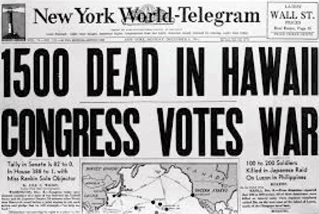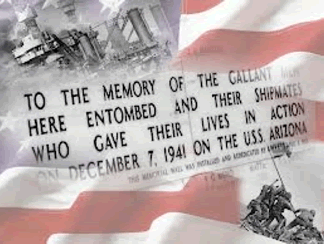Notes from the Lampert Library
 Every generation probably has a day that it will never forget, a day that changed the country and its trajectory-Sept 11, 2001, November 22, 1963, December 7, 1941. Almost every living American remembers what happened on at least one of these history changing dates.
Every generation probably has a day that it will never forget, a day that changed the country and its trajectory-Sept 11, 2001, November 22, 1963, December 7, 1941. Almost every living American remembers what happened on at least one of these history changing dates.
Seventy-three years ago, when Pearl Harbor in Hawaii was bombed by the Japanese, the United went reluctantly into the Second World War, the good war. The U.S. after World War I was tired of conflict. The Great Depression had sapped its energy and politicians and statesmen alike looked inward rather than outward toward the rest of the world.
President Woodrow Wilson had lost his fight to have the U.S. join the nascent League of Nations, one of the ailing president’s dreams. That defeat set the tone for the next years.
Then came Franklin Roosevelt who would guide, scold and manipulate the United States into becoming Europe’s rescuer and the next great power in the Free World.
Since the beginning of World War II there had been and still is debate about how the U.S. should have proceeded. Many Jews hailed Roosevelt as the greatest president ever and the savior of the remnant of European Jews. Others, especially in hindsight and with the passage of time, see Roosevelt as a politician, not a savior. Should and could have Roosevelt done more? Would action to save Jews have jeopardized the larger issue of defeating Germany?
 We may never have the definitive answer but the Lampert Library, as well as the public library system (BCCLS) have books on the subject. From Pearl Harbor to the liberation of the concentration camps, one can read widely and try to come to a conclusion. It is interesting to note the change in attitude as more documents have come to light and as the political winds have shifted.
We may never have the definitive answer but the Lampert Library, as well as the public library system (BCCLS) have books on the subject. From Pearl Harbor to the liberation of the concentration camps, one can read widely and try to come to a conclusion. It is interesting to note the change in attitude as more documents have come to light and as the political winds have shifted.
What is not in doubt is that without the United States, Europe’s fate very well may have been different and even the surviving European Jews would have been destroyed. There would probably today be no Israel.
And as for you and I, let’s not even speculate.
See the following list for books related to the topic of Pearl Harbor.
Day of Infamy (Lord) is the classic study of Pearl Harbor with interview with survivors from both sides (1957)
The Fugu Plan: The Untold Story of the Japanese and the Jews during World War II (Tokayer) tells of Japan’s secret plan to save as many Jews as possible and use their talents for the betterment of Japan (1979, 2004)
At Dawn We Slept (Prange) is an exhaustive study of the Pearl Harbor attack written in 19821 and then revised on the 50th anniversary of the attack to reflect new information. (1981, 1991)
Day of Deceit (Stinnett) focuses on the issue of whether Roosevelt knew about the plan to bomb Pearl Harbor and withheld the information in order to push the U/S. into war. (2000)
Pearl Harbor: the day of infamy, an illustrated history (Van der Vat) is an even-handed look that memorializes the attack on Pearl Harbor with pictures, interviews with both Americans and Japanese. (2001)
- Is It Passover Yet? - Thu, Apr 18, 2024
- MESH Report April 9, 2024 - Thu, Apr 11, 2024
- Guess Who? - Wed, Mar 13, 2024
